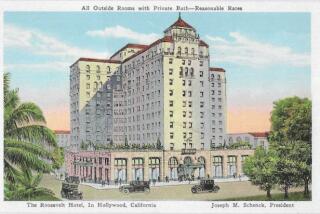‘Singer’ ushered in a new sound
- Share via
“The Jazz Singer” isn’t the greatest film ever made. It isn’t even the first all-talking motion picture. But when the Warner Bros. production opened in New York on Oct. 6, 1927, the drama, which stars Broadway musical superstar Al Jolson and features synchronized sound and musical sequences, brought down the curtain on silent cinema and ushered in the sound era.
“It’s difficult if not impossible to picture what a moviegoer’s reaction would have been back then,” says film historian Leonard Maltin. Though Jolson always toured the country in his latest Broadway hit, on the big screen, “you could now see him larger than life. Every seat was a great seat. Everyone had an orchestra seat, in essence. So much of film history is garbled and obscured by lore and legend. . . . This was literally a sensation.”
Based on the hit play by Samson Raphaelson, “The Jazz Singer” casts Jolson as Jakie Rabinowitz, the only child of a conservative Jewish cantor who leaves his family as a teenager when his father won’t allow him to sing jazz. As the years go by, he changes his name to Jack Robin and becomes a musical comedy entertainer. When he returns to New York to appear on Broadway, Jack finds himself torn between his musical-comedy career and his Jewish roots.
The film features Jolson singing several of his standard songs including “Mammy” and “Blue Skies.” During his first musical number, Jolson literally changed the world when he ad-libbed the lines: “Wait a minute, wait a minute, you ain’t heard nothin’ yet. Wait a minute, I tell ya, you ain’t heard nothin’. You want to hear ‘Toot, Toot, Tootsie’?”
The Academy of Motion Picture Arts and Sciences is celebrating the film’s 80th anniversary Friday -- just one day shy of its original premiere date -- with a newly restored and remastered digital version made from the earliest surviving nitrate film elements and original Vitaphone sound-on-disc recordings by Warner Bros. Maltin will host the screening.
On Saturday and Sunday, the American Cinematheque is also presenting a tribute to Jolson with a live cabaret act, plus several of his films. And on Oct. 16, Warner Home Video is releasing a three-disc DVD set of the film, plus several early shorts and a documentary.
Experiments had been made with sound on film since the 1890s, but without satisfactory results. Then in 1926, Sam Warner, who was the chief executive of Warner Bros., formed a subsidiary called the Vitaphone Co. in association with Western Electric. The contract gave the studio an exclusive license for recording and reproducing sound pictures under the Western Electric system, which used a sound-on-disc synchronized method.
A few months later, the studio added music and sound effects to its John Barrymore swashbuckler “Don Juan,” and created several Vitaphone shorts featuring noted vaudevillians and opera stars. But Warner never thought of the Vitaphone system as a way to introduce talkies.
“Sam was so excited that they could have music in the theaters in small towns and every town could not only have an orchestral accompaniment, but a variety show of shorts,” says historian Rudy Behlmer. “The plan was not to do talking pictures. It was, ‘We are going to have music and shorts and everybody is going to be happy.’ ”
When inspiration struck
But then Warner came up with the idea of doing a feature film that would include both a synchronized orchestral score and musical numbers. Enter “The Jazz Singer.”
“You know how a seed is planted and it grows,” says theater historian Miles Krueger. “If we think of the blossom as this movie, the seed was actually planted on April 25, 1917.”
That’s when Raphaelson saw Jolson on tour in Champaign, Ill., in “Robinson Crusoe Jr.”
“He was so awed by Jolson that he couldn’t get Jolson out of his head,” says Krueger. Jolson’s electrifying performance inspired him to write the short story “The Day of Atonement,” which was published in early 1922. Raphaelson then took that story and turned it into a straight play, “The Jazz Singer,” which opened on Broadway in 1925 with comic vaudevillian George Jessel.
“He was one of those working comics who sings,” says Krueger. “But this is what really put Jessel on the map.” And brought him to the attention of Warner Bros., who cast him in the silent comedy “Private Izzy Murphy.” The film was such a box office success, the studio bought the film rights to “The Jazz Singer” for $50,000 and cast Jessel.
But when Warner decided to include songs, Jessel balked. He told them he wasn’t being paid to sing and wanted more money -- in fact, $10,000 more. But the studio didn’t cave in to his demands.
Instead it offered the film to Jolson, who had already made the 1926 Vitaphone short “A Plantation Act,” which screens Saturday at the Cinematheque.
“His being hired to do ‘The Jazz Singer’ was really based on the fact that he was the inspiration for the story in the first place,” says Krueger. “So it came full circle.”
“The Jazz Singer” made $3.5 million in profits. And at the first Oscar ceremony on May 16, 1929, academy President Douglas Fairbanks gave a special award to Warner production head Darryl F. Zanuck for “producing ‘The Jazz Singer,’ the pioneer outstanding talking picture, which has revolutionized the industry.”
Zanuck dedicated the award to Sam Warner, “the man responsible for the successful usage of the medium.”
--
--
‘The Jazz Singer’
Where: Samuel Goldwyn Theater, Academy of Motion Picture Arts and Sciences, 8949 Wilshire Blvd., Beverly Hills
When: 8 p.m. Friday
Price: $5
Contact: (310) 247-3600 or go to www.oscars.org
Also
“You Ain’t Heard Nothing Yet: A Tribute to Al Jolson on the 80th Anniversary of ‘The Jazz Singer’ ”
Where: American Cinematheque at the Egyptian Theatre, 6712 Hollywood Blvd., Hollywood
When: 6:30 p.m. Saturday: “Al Jolson: On the Road to the Jazz Singer,” with cabaret revue, “A Plantation Act” and “The Jolson Story”
7:30 p.m. Sunday: “Hallelujah, I’m a Bum!” and “Big Boy”
Price: $20 Sat.; $10 Sun.
Contact: (323) 466-FILM or go to www.americancinematheque.com
More to Read
Only good movies
Get the Indie Focus newsletter, Mark Olsen's weekly guide to the world of cinema.
You may occasionally receive promotional content from the Los Angeles Times.










